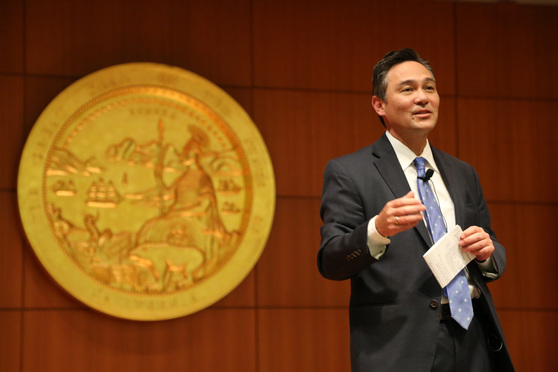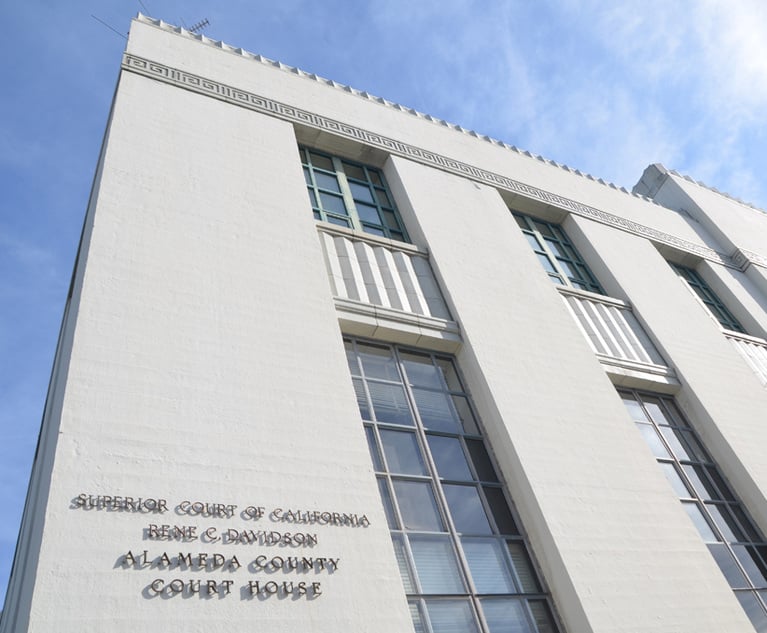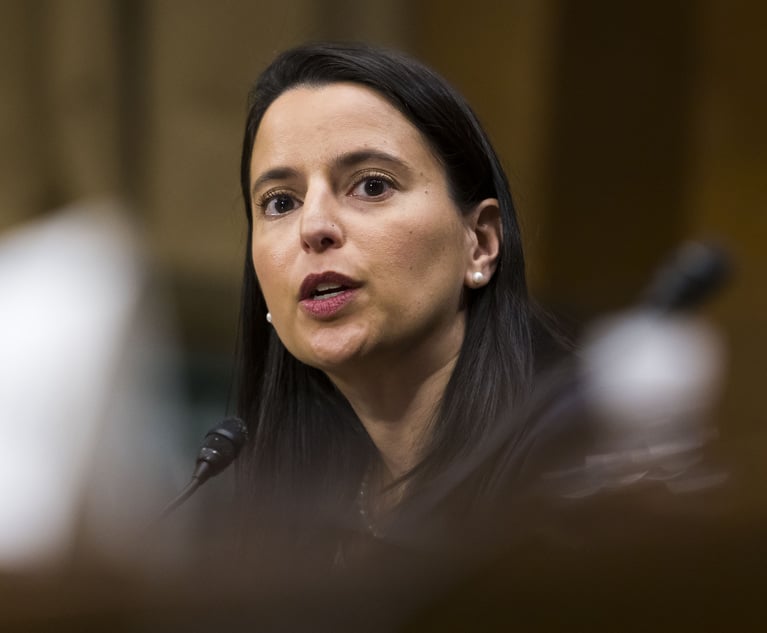Judicial Council Prepares to Repeal COVID-19 Rules on Evictions, Bail
"These rules achieved their goals—to reduce harm, save lives, and help 'flatten the curve' of the pandemic," Martin Hoshino, administrative director of the Judicial Council, said in a statement. "As a result, 51 California counties and our courthouses have started a phased, safe reopening."
June 09, 2020 at 12:40 PM
4 minute read
 Martin Hoshino, administrative director of the Judicial Council. Courtesy photo
Martin Hoshino, administrative director of the Judicial Council. Courtesy photo
The Judicial Council is poised to repeal three emergency rules adopted this spring as the COVID-19 pandemic shuttered courtrooms around the state.
The council late Monday released a circulating order that would sunset a freeze on evictions and judicial foreclosures later this summer. A second order would rescind on June 20 a temporary schedule that set bail at $0.
The council will also consider recommending that Chief Justice Tani Cantil-Sakauye repeal her order extending the deadline for defendants to be arraigned beyond 48 hours.
"These rules achieved their goals—to reduce harm, save lives and help 'flatten the curve' of the pandemic," Martin Hoshino, administrative director of the Judicial Council, said in a statement. "As a result, 51 California counties and our courthouses have started a phased, safe reopening. A statewide rule no longer serves our need to be flexible and responsive based on local health conditions."
The targeted rules are among 13 adopted hurriedly by the Judicial Council this spring as statewide stay-at-home orders forced court employees, jurors, judges, lawyers and litigants out of courts. An unprecedented executive order signed by Gov. Gavin Newsom on March 27 freed judicial branch leaders from traditional restrictions on their statutory authority.
The rules staying evictions and judicial foreclosures were scheduled to stay in effect until 90 days after the governor lifts the pandemic-related state of emergency. The circulating order would end those rules Aug. 3. With courts reopening, judges have more time to handle nonurgent matters, according to a Judicial Council statement.
"Housing policy decisions are usually left to the state Legislature, which was unable to hold sessions during the statewide shelter-in-place order," said Monterey County Superior Court Judge Marla Anderson, who chairs the Judicial Council's legislation committee. "With the Legislature back in session, lawmakers can address any measures needed to protect the homes and businesses of those affected by the pandemic."
Newsom in March signed an executive order authorizing local governments to halt evictions of renters and homeowners who can document pandemic-related hardships. Pending state legislation would pay landlords 80% of rental payments missed by tenants affected by the pandemic, so long as the tenants are not evicted from their homes.
Assemblyman David Chiu, D-San Francisco, criticized the council's proposed repeal of eviction protections, saying in a statement that "the emergency is not over."
"Allowing renters to be forced from their homes will not only put countless Californians at risk of homelessness, but also threaten the public health of all communities," Chiu said in a statement issued Tuesday. "While the Legislature should step in to address these issues, removing protections for renters and homeowners months before legislative solutions are agreed upon and take effect is ill-conceived and will result in a rush to evict.
The second circulating order would drop the $0 bail schedule, which was originally imposed to reduce jail populations and the spread of COVID-19. Judicial Council staff say the state is expected to begin transferring convicted inmates to jails once again by June 19, easing crowding concerns.
"We urge local courts to continue to use the emergency COVID-19 bail schedules where necessary to protect the health of the community, the courts, and the incarcerated," said Justice Marsha Slough of the Fourth District Court of Appeal, who chairs the executive and planning committee.
Sheriffs around the state have accused the $0 bail schedule of creating a revolving door at local jails.
Council members have until June 10 to vote on the circulating orders.
Read more:
'How Do We Exit?' Judicial Council's Leader Ponders Post-Pandemic Court Operations
Judicial Council Adopts Emergency COVID-19 Rules on Civil Deadlines, Bail
Governor Gives California Chief Justice 'Unprecedented' Authority to Address Pandemic
This content has been archived. It is available through our partners, LexisNexis® and Bloomberg Law.
To view this content, please continue to their sites.
Not a Lexis Subscriber?
Subscribe Now
Not a Bloomberg Law Subscriber?
Subscribe Now
NOT FOR REPRINT
© 2025 ALM Global, LLC, All Rights Reserved. Request academic re-use from www.copyright.com. All other uses, submit a request to [email protected]. For more information visit Asset & Logo Licensing.
You Might Like
View All

Fresh lawsuit hits Oregon city at the heart of Supreme Court ruling on homeless encampments
4 minute read
Trending Stories
- 1Google Makes Appeal to Overturn Jury Verdict Branding the Play Store as an Illegal Monopoly
- 2First Amendment Litigator Returns to Gibson Dunn
- 3In Record Year for Baker Botts, Revenue Up 11.8%, PEP Up 17.6%
- 4Loopholes, DNA Collection and Tech: Does Your Consent as a User of a Genealogy Website Override Another Person’s Fourth Amendment Right?
- 5Free Microsoft Browser Extension Is Costing Content Creators, Class Action Claims
Who Got The Work
J. Brugh Lower of Gibbons has entered an appearance for industrial equipment supplier Devco Corporation in a pending trademark infringement lawsuit. The suit, accusing the defendant of selling knock-off Graco products, was filed Dec. 18 in New Jersey District Court by Rivkin Radler on behalf of Graco Inc. and Graco Minnesota. The case, assigned to U.S. District Judge Zahid N. Quraishi, is 3:24-cv-11294, Graco Inc. et al v. Devco Corporation.
Who Got The Work
Rebecca Maller-Stein and Kent A. Yalowitz of Arnold & Porter Kaye Scholer have entered their appearances for Hanaco Venture Capital and its executives, Lior Prosor and David Frankel, in a pending securities lawsuit. The action, filed on Dec. 24 in New York Southern District Court by Zell, Aron & Co. on behalf of Goldeneye Advisors, accuses the defendants of negligently and fraudulently managing the plaintiff's $1 million investment. The case, assigned to U.S. District Judge Vernon S. Broderick, is 1:24-cv-09918, Goldeneye Advisors, LLC v. Hanaco Venture Capital, Ltd. et al.
Who Got The Work
Attorneys from A&O Shearman has stepped in as defense counsel for Toronto-Dominion Bank and other defendants in a pending securities class action. The suit, filed Dec. 11 in New York Southern District Court by Bleichmar Fonti & Auld, accuses the defendants of concealing the bank's 'pervasive' deficiencies in regards to its compliance with the Bank Secrecy Act and the quality of its anti-money laundering controls. The case, assigned to U.S. District Judge Arun Subramanian, is 1:24-cv-09445, Gonzalez v. The Toronto-Dominion Bank et al.
Who Got The Work
Crown Castle International, a Pennsylvania company providing shared communications infrastructure, has turned to Luke D. Wolf of Gordon Rees Scully Mansukhani to fend off a pending breach-of-contract lawsuit. The court action, filed Nov. 25 in Michigan Eastern District Court by Hooper Hathaway PC on behalf of The Town Residences LLC, accuses Crown Castle of failing to transfer approximately $30,000 in utility payments from T-Mobile in breach of a roof-top lease and assignment agreement. The case, assigned to U.S. District Judge Susan K. Declercq, is 2:24-cv-13131, The Town Residences LLC v. T-Mobile US, Inc. et al.
Who Got The Work
Wilfred P. Coronato and Daniel M. Schwartz of McCarter & English have stepped in as defense counsel to Electrolux Home Products Inc. in a pending product liability lawsuit. The court action, filed Nov. 26 in New York Eastern District Court by Poulos Lopiccolo PC and Nagel Rice LLP on behalf of David Stern, alleges that the defendant's refrigerators’ drawers and shelving repeatedly break and fall apart within months after purchase. The case, assigned to U.S. District Judge Joan M. Azrack, is 2:24-cv-08204, Stern v. Electrolux Home Products, Inc.
Featured Firms
Law Offices of Gary Martin Hays & Associates, P.C.
(470) 294-1674
Law Offices of Mark E. Salomone
(857) 444-6468
Smith & Hassler
(713) 739-1250







